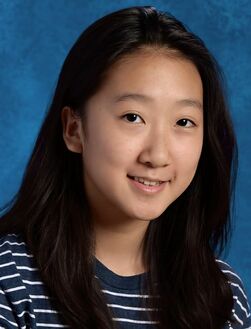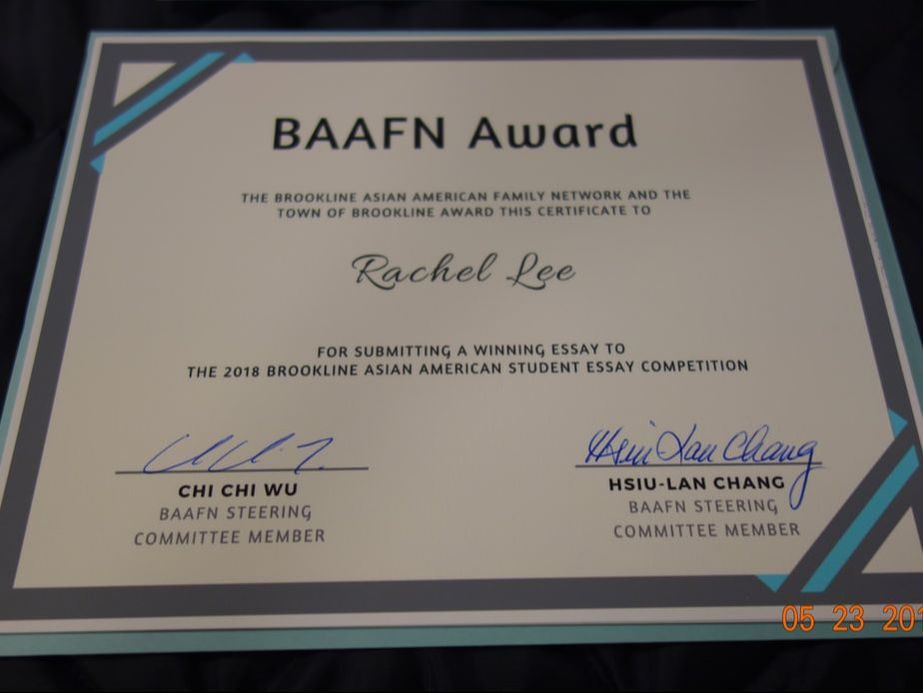2018 BAAFN Award
MY VOICE
by Rachel Lee
by Rachel Lee
I am known in my family for losing almost everything that finds its way into my possession, from miscellaneous collections of replaceable items such as chapsticks and socks, to new phones and rented violins. Each loss would ensue a rush of frantic searching, a helpless feeling of never quite knowing where to start the hunt.
The longest of these losses, the type that creeps up into your mind to remind you of its unclaimed status, has been my undeniable certainty of being Korean. It used to wedge within the gaps of my teeth the way my mother’s red pepper paste clings between thick pages of cabbage leaves, the way that my scarlet Hanbok skirt sticks to thin layers of sweat on a particularly humid day. Every new English book I read was another Korean book I didn’t read, and the words that slipped away didn’t become a problem until I made it one. Two years ago, when I visited Aunt Minnie’s apartment in Seoul, I discovered that my eight-year old cousin was now spewing vocabulary I was unable to digest. I would nod along, pretending as if her words flowed through my system naturally the way it did in hers, but I could feel each carved Hangul letter bleeding out. I looked the part amid other Koreans, yet I didn’t know the dates of Korean holidays, and their casual slang never imprinted in my mind. I was a shell of all East Asian stereotypes: yellow skin, onyx hair, squinted eyes, but my core was a blend of more than what the mirror promised. I would know only pieces of the Aegukga anthem and yet all the words of the Star Spangled Banner failed
me, too. There were fourth grade days when I would sit with my mother’s laptop, regurgitating the right words from song clips until rocket’s red glare was perfect. Clean-cut, proud, American perfect.
Yet, every loss I faced had a solution. Losses grew into gains.
I learned that there is a richness to being rooted in more places than one. My family used to visit Korea almost every summer, and each time, I would breathe in new pieces of the country I had never known. I would discover where my grandfather’s old grape vines would hang, try new authentic delicacies that Uncle would take me out for, I would even notice how the neon signs glowed differently in Seoul. It sounds absurd, I know, but they do. I would indulge in spicy street tteok-bokki, yellowed fish cakes soaked in steaming soup, learning to remember that the local market sold these treats every Thursday near the playground until it became routine.
Yet, when I returned home, I could still taste how salty the Massachusetts air would sit so alive on my tongue. Sticking my head out on the car ride home from the airport, I would soak up every last bit of the oxygen circulating Brookline, this town that had raised me, and I would realize that there is something to be said about being made up of two parts. It was about being the blunt of dog-eating jokes, comments I would laugh along with because
it’s just a joke, relax. It was about finding a voice in a classroom that wouldn’t see me as more than that “quiet, Asian girl” until I learned how to speak up, how to be the living, breathing Asian-American I was.
This voice that I found did not have to speak in Korean, or even English for that matter. It just had to speak in the way I took every step, the way I laughed, the way I loved. It was about meshing the two languages when a certain word didn’t fit in the other, or about finally not being embarrassed each time a new teacher called my Korean name off the roster, and dreading the moment when I would have to whisper my American name back. It was about how I had always assumed my mother to be a person of shy character, always speaking in hushed tones with American strangers until she walked the streets of Korea with me. There was an undeniable ease that she had in her native tongue, her speech void of all stutters or hesitation. It was about celebrating both sides of her. It was about loving the red, white, and blue; it was about realizing that red, white, and blue are Korean colors, too. That I can and I will be both.
The longest of these losses, the type that creeps up into your mind to remind you of its unclaimed status, has been my undeniable certainty of being Korean. It used to wedge within the gaps of my teeth the way my mother’s red pepper paste clings between thick pages of cabbage leaves, the way that my scarlet Hanbok skirt sticks to thin layers of sweat on a particularly humid day. Every new English book I read was another Korean book I didn’t read, and the words that slipped away didn’t become a problem until I made it one. Two years ago, when I visited Aunt Minnie’s apartment in Seoul, I discovered that my eight-year old cousin was now spewing vocabulary I was unable to digest. I would nod along, pretending as if her words flowed through my system naturally the way it did in hers, but I could feel each carved Hangul letter bleeding out. I looked the part amid other Koreans, yet I didn’t know the dates of Korean holidays, and their casual slang never imprinted in my mind. I was a shell of all East Asian stereotypes: yellow skin, onyx hair, squinted eyes, but my core was a blend of more than what the mirror promised. I would know only pieces of the Aegukga anthem and yet all the words of the Star Spangled Banner failed
me, too. There were fourth grade days when I would sit with my mother’s laptop, regurgitating the right words from song clips until rocket’s red glare was perfect. Clean-cut, proud, American perfect.
Yet, every loss I faced had a solution. Losses grew into gains.
I learned that there is a richness to being rooted in more places than one. My family used to visit Korea almost every summer, and each time, I would breathe in new pieces of the country I had never known. I would discover where my grandfather’s old grape vines would hang, try new authentic delicacies that Uncle would take me out for, I would even notice how the neon signs glowed differently in Seoul. It sounds absurd, I know, but they do. I would indulge in spicy street tteok-bokki, yellowed fish cakes soaked in steaming soup, learning to remember that the local market sold these treats every Thursday near the playground until it became routine.
Yet, when I returned home, I could still taste how salty the Massachusetts air would sit so alive on my tongue. Sticking my head out on the car ride home from the airport, I would soak up every last bit of the oxygen circulating Brookline, this town that had raised me, and I would realize that there is something to be said about being made up of two parts. It was about being the blunt of dog-eating jokes, comments I would laugh along with because
it’s just a joke, relax. It was about finding a voice in a classroom that wouldn’t see me as more than that “quiet, Asian girl” until I learned how to speak up, how to be the living, breathing Asian-American I was.
This voice that I found did not have to speak in Korean, or even English for that matter. It just had to speak in the way I took every step, the way I laughed, the way I loved. It was about meshing the two languages when a certain word didn’t fit in the other, or about finally not being embarrassed each time a new teacher called my Korean name off the roster, and dreading the moment when I would have to whisper my American name back. It was about how I had always assumed my mother to be a person of shy character, always speaking in hushed tones with American strangers until she walked the streets of Korea with me. There was an undeniable ease that she had in her native tongue, her speech void of all stutters or hesitation. It was about celebrating both sides of her. It was about loving the red, white, and blue; it was about realizing that red, white, and blue are Korean colors, too. That I can and I will be both.



